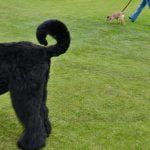Play biting is a common behavior in dogs, especially during their puppy stage. Understanding how to train a dog from play biting is crucial for dog owners to maintain a harmonious relationship with their furry companions. Play biting is often a natural part of canine behavior as dogs explore their surroundings and engage in social interactions with other dogs and humans.
However, play biting can sometimes escalate into behaviors that are concerning for dog owners. While playful nipping can be harmless, it’s essential to set clear boundaries and establish rules for playtime to prevent any potential aggression or harm. By redirecting this behavior and teaching alternative ways to play, owners can effectively address play biting while ensuring that their dogs still enjoy playful interactions.
Consistency is key when training a dog from play biting. Reinforcing training techniques regularly, along with positive reinforcement for good behavior, can help reinforce the desired behaviors in dogs. Patience and persistence are necessary when dealing with setbacks, as changing ingrained behaviors takes time and dedication. Ultimately, by understanding the causes of play biting and implementing effective training methods, dog owners can celebrate progress and build a strong bond with their beloved pets.
Why Play Biting Can Be a Concern for Dog Owners
Play biting, while considered a normal behavior in puppies, can become a concern for dog owners as their pets grow older. This behavior is often exhibited during playtime or when the dog is seeking attention, but it can escalate and potentially lead to aggressive biting if not addressed promptly and effectively. Understanding why play biting can be concerning for dog owners is crucial in implementing proper training methods to correct this behavior.
One reason why play biting can be worrisome for dog owners is that it may result in unintentional harm to humans or other animals. Even though the intention behind the behavior may be harmless from the dog’s perspective, their sharp teeth and strong jaws can cause injuries if not controlled. Additionally, allowing play biting to persist without intervention can lead to the reinforcement of this behavior, making it more challenging to address as the dog gets older.
To address play biting effectively, dog owners must establish clear boundaries and rules during playtime. Setting limits on how rough the play can get and teaching the dog appropriate ways to interact during play are essential steps in curbing this behavior. Here are some strategies on how to train a dog from play biting:
- Provide appropriate chew toys for the dog where they can redirect their mouthing behavior.
- Use positive reinforcement by rewarding your dog when they exhibit gentle playing behavior.
- Redirect their attention by offering them a favorite toy or engaging them in a different activity when they start play biting.
By consistently reinforcing these training techniques and being patient and persistent in correcting undesirable behaviors, dog owners can effectively train their dogs from play biting. Remember that seeking professional help from a trainer or behaviorist may also be beneficial if you are facing challenges in modifying this behavior. With dedication and a proactive approach, you can help your furry friend learn appropriate ways to interact during playtime, ultimately strengthening your bond with them.
Setting Clear Boundaries
Play biting is a common behavior in dogs, especially puppies, as it is their way of exploring and interacting with the world around them. However, it can become a concern for dog owners if not addressed properly. Setting clear boundaries and establishing rules for playtime is essential when training a dog from play biting.
To effectively train a dog from play biting, it is crucial to establish consistent rules and boundaries during playtime. Here are some tips on how to do this:
- Use a firm tone: When your dog starts to play bite, use a firm tone to communicate that this behavior is not acceptable.
- Provide appropriate toys: Make sure to provide your dog with plenty of appropriate toys to chew on during playtime, redirecting their focus away from biting humans.
- Take breaks: If your dog becomes too rough during play, take short breaks to signal that biting results in the end of playtime.
Consistency is key when setting boundaries for playtime. It’s important to reinforce these rules every time you engage in play with your dog to ensure they understand what behavior is acceptable and what is not. With patience and persistence, you can effectively train your dog from play biting and strengthen the bond between you both.
Redirecting Behavior
Play biting is a common behavior in dogs, especially during their puppy stages. While it may seem harmless and even cute at first, it is essential for dog owners to address this behavior early on to prevent any potential issues in the future. One of the most effective ways to train a dog from play biting is by redirecting their behavior towards more appropriate forms of play.
When your dog starts play biting, it’s important to immediately redirect their attention to a suitable toy or object. This will help them understand that biting humans is not acceptable, but playing with toys is encouraged. By consistently providing alternative outlets for their energy and playful behavior, you can effectively teach your dog what is and isn’t acceptable during playtime.
In addition to redirecting their behavior towards toys, another effective method is teaching them basic commands such as “sit” or “down.” By incorporating these commands into playtime, you can redirect their focus and energy in a positive way. Training your dog to respond to commands during play will not only help prevent play biting but also strengthen the bond between you and your furry friend. Practice these commands consistently and praise them for following instructions to reinforce good behavior.
Consistency Is Key
When it comes to training a dog from play biting, consistency is crucial. Dogs thrive on routine and repetition, so it’s essential to reinforce the training techniques consistently. This means that every time your dog engages in play biting behavior, you need to respond with the same corrective action. Whether it’s redirecting the behavior or setting clear boundaries, make sure that you are always using the same approach.
One effective way to reinforce training techniques is by implementing a reward system. Positive reinforcement has been shown to be one of the most successful methods for modifying a dog’s behavior. Whenever your canine companion displays good behavior during playtime, such as gentle mouthing instead of hard biting, be sure to reward them with praise, treats, or toys. This not only reinforces the desired behavior but also strengthens the bond between you and your furry friend.
To maintain consistency in reinforcing training techniques, it’s important to communicate effectively with all family members or anyone who interacts with your dog regularly. Make sure that everyone is on the same page when it comes to how to train a dog from play biting. Consistency in responding to unwanted behavior will help your pet understand what is acceptable during playtime and what is not.
| Key Points | Details |
|---|---|
| Consistency | Reinforce training techniques consistently. |
| Reward System | Implement positive reinforcement through rewards. |
| Effective Communication | Ensure all family members are consistent in responding to play biting. |
Positive Reinforcement
One way to implement positive reinforcement in training your dog from play biting is by using treats as rewards. Whenever your dog engages in gentle play or refrains from biting, immediately praise them and offer a treat as a reward.
This helps them associate good behavior with receiving something they enjoy, making them more likely to continue behaving in a similar manner. Consistency is key when using this method, as rewarding good behavior every time it occurs will help reinforce the desired actions effectively.
In addition to treats, you can also use toys or verbal praise as forms of positive reinforcement when training your dog from play biting. For example, if your dog starts to bite during playtime but then switches to a toy instead, praise them enthusiastically and engage in interactive play with the toy.
This not only redirects their behavior in a positive way but also reinforces the use of toys as an appropriate outlet for their energy and excitement. Over time, with consistent reinforcement of good behavior, you can effectively train your dog to replace play biting with more suitable ways of interacting during playtime.
Patience and Persistence
Understanding the Importance of Patience and Persistence
When it comes to training a dog from play biting, patience and persistence are key elements in the process. Dogs, especially puppies, may not learn new behaviors overnight. It takes time for them to understand and adapt to the rules you set during playtime. It is essential to remember that training a dog is a gradual process that requires consistent effort and reinforcement.
Dealing With Setbacks Along the Way
It is common to experience setbacks when training a dog from play biting. Dogs may revert to their old habits, such as nipping or using excessive force during play. It is crucial not to get discouraged during these setbacks, as they are a natural part of the learning process. Instead, remain patient and continue reinforcing the training techniques you have established.
Staying Committed and Consistent
In order to effectively address play biting behavior in dogs, it is important to stay committed and consistent with your training efforts. This means enforcing the rules consistently, providing alternative ways for your dog to play, and rewarding good behavior promptly. By maintaining your patience and persistence throughout the training process, you will ultimately see progress in reducing play biting behaviors in your furry friend.
Seeking Professional Help
Recognizing the Need for Professional Assistance
Sometimes, despite our best efforts and dedication to training our dogs, certain behaviors like play biting can persist and become a serious issue. If you find yourself struggling to effectively address this behavior on your own, it may be time to consider seeking the help of a professional dog trainer. Professional trainers have the expertise and experience to assess your dog’s behavior accurately and provide customized solutions to address play biting.
Choosing the Right Trainer
When considering hiring a professional trainer to help with your dog’s play biting behavior, it is crucial to do thorough research and choose a trainer that aligns with your training philosophy and goals. Look for trainers who have experience in dealing with behavioral issues like play biting and have a positive reputation within the dog training community. Additionally, it is essential to ensure that the trainer uses positive reinforcement techniques rather than punishment-based methods.
Working Together Towards Success
Once you have selected a professional trainer to work with, it is vital to actively participate in the training process and follow their guidance consistently. Communicate openly with the trainer about your concerns regarding your dog’s play biting behavior and be willing to implement any recommended strategies or exercises. Remember that every dog is unique, and progress may take time, so patience and persistence are key when working with a professional trainer on addressing play biting issues.
By seeking help from a qualified dog trainer, you can receive valuable support and guidance in effectively addressing your dog’s play biting behavior. With their expertise and tailored approach to training, you can learn how to train a dog from play biting while strengthening the bond between you and your furry companion.
Conclusion
Play biting in dogs can be a common behavior issue that many dog owners face. However, with the right training and techniques, it is possible to curb this behavior and foster a stronger bond with your furry friend. By understanding the reasons behind play biting and setting clear boundaries during playtime, you can effectively train your dog to exhibit more desirable behaviors.
Setting rules for playtime and redirecting their behavior towards more appropriate alternatives are essential steps in training a dog from play biting. Consistency is key when implementing these training techniques, as dogs thrive on routines and clear expectations. Positive reinforcement through rewards and praise can also go a long way in reinforcing good behavior and encouraging your dog to continue making progress.
As you embark on the journey of training your dog from play biting, remember to approach setbacks with patience and persistence. Rome wasn’t built in a day, and changing behavior patterns takes time.
If you find yourself struggling to make progress or facing challenges beyond your expertise, do not hesitate to seek help from a professional trainer who specializes in canine behavior. Ultimately, by celebrating each small victory along the way, you are not only shaping your dog’s behavior but also strengthening the bond between you both.
Frequently Asked Questions
How Do I Get My Dog to Stop Playful Biting?
One effective way to get your dog to stop playful biting is by redirecting their behavior. Whenever your dog starts playfully biting, immediately give them a toy or a chew bone to focus their attention on. Consistency is key in reinforcing this positive behavior.
How Do You Discipline a Dog for Play Biting?
Discipline for play biting in dogs should focus on redirection rather than punishment. If your dog nips during play, issue a firm verbal command such as “no bite” and then provide an appropriate toy for them to bite instead. It’s important not to use physical punishments as they can create fear and aggression in your pet.
Do Dogs Grow Out of Play Biting?
Dogs typically grow out of play biting as they mature and learn proper behaviors through training and socialization. Puppies are more prone to this behavior as they explore the world with their mouths, but with consistent training and positive reinforcement, most dogs will eventually outgrow this habit.
Patience and training are key in helping your puppy develop into a well-behaved adult dog.

Welcome to the blog! I am a professional dog trainer and have been working with dogs for many years. In this blog, I will be discussing various topics related to dog training, including tips, tricks, and advice. I hope you find this information helpful and informative. Thanks for reading!





